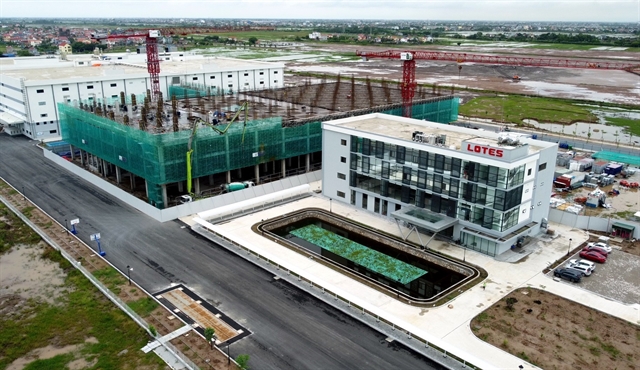The southern economic hub of HCM City ranked the top in foreign investment attraction with 12,398 projects worth $57.63 billion, accounting for 31.67 per cent of the total number of projects and nearly 13 per cent of the total registered capital.

Việt Nam attracted 39,140 foreign-invested projects with a total registered capital of over US$468.91 billion by the end of 2023, said the Foreign Investment Agency under the Ministry of Planning and Investment (MPI).
The southern economic hub of HCM City ranked the top in foreign investment with 12,398 projects worth $57.63 billion, accounting for 31.67 per cent of the total number of projects and nearly 13 per cent of the total registered capital.
The capital city came next with 7,363 projects capitalised at $41.17 billion while the southern province of Bình Dương ranked third with 4,217 projects valued at $40.4 billion.
Other major investment destinations in Việt Nam included Đồng Nai, Bà Rịa-Vũng Tàu, Hải Phòng, Bắc Ninh, Thanh Hóa, Long An and Quảng Ninh.
Meanwhile, ten localities with the lowest amounts of foreign investment were Lai Châu, Điện Biên, Hà Giang, Cao Bằng, Bắc Kạn, Sơn La, Tuyên Quang, Gia Lai, Đồng Tháp and Cà Mau.
In 2023 alone, the country lured $36.6 billion worth of foreign investment with major investment destinations including HCM City, Hải Phòng, Quảng Ninh, Bắc Giang, Hà Nội, Bắc Ninh, Bình Dương, and Đồng Nai.
According to the MPI, in the past, foreign investment flows into Việt Nam still focused on provinces and cities that have many advantages such as favourable infrastructure and stable human resources, administrative reform and dynamism in investment promotion.
Deputy Minister of Planning and Investment Trần Quốc Phương said at a recent meeting that the position and role of Việt Nam in the global FDI flows had continued to improve.
The Southeast Asian country had been an attractive foreign investment destination, with registered capital in 2023 reaching about $36.6 billion, a year-over-year increase of over 32 per cent. At the same time, it had also proactively invested abroad, even in developed economies and in new industries.
Việt Nam had strongly promoted innovation, digital economy, green growth, circular economy and new economic sectors such as chip manufacturing, semiconductors, high-tech agriculture, and mining as well as high-quality human resources training to better seize opportunities from major countries’ strategic competition, global foreign investment flow shifting, free trade agreements and partnerships with other countries.
However, Phương said that Việt Nam’s foreign investment in the new situation still faced shortcomings in terms of institutions, policies, investment quality and efficiency.
He added that the country was a bright spot in foreign investment attraction in the world. However, the link between the foreign-invested sector and domestic enterprises remained weak, which leads to slow technology transfer and the country's low position in the global value chains. — VNS
|
487 new projects pumped into Red River Delta zones HÀ NỘI — Industrial parks, export processing, and economic zones in the Red River Delta provinces attracted 487 new investment projects, including 390 foreign-invested, in 2023, up 67 per cent year-on-year. Last year, the total new and adjustment investment capital in these zones reached above $17 billion. This impressive figure was thanks to the endless efforts of the zones' management boards in monitoring and updating the operating situation of businesses and then promptly advising the provincial and city people's committees on measures to help them overcome difficulties and stabilise production and business. Last year, the boards also strengthened the cooperation in implementing investment promotion activities and facilitating investors, said Trần Văn Kiên, head of the Industrial Park Management Board of Hà Nam province. As a result, the total revenue of foreign-invested firms in these zones hit over $142.8 billion in 2023, 20.5 per cent higher than the previous year. Meanwhile, domestic-financed businesses also saw a significant revenue increase of 35 per cent to over VNĐ475.5 trillion. Currently, the Red River Delta region is home to 11 economic zones, covering a total area of over 442,200ha. It also has 179 industrial parks and export processing zones, spanning above 49,340ha. — VNS |





